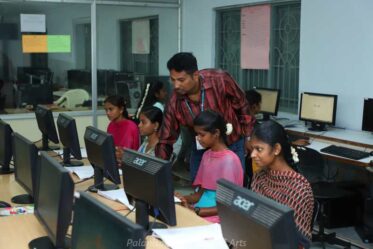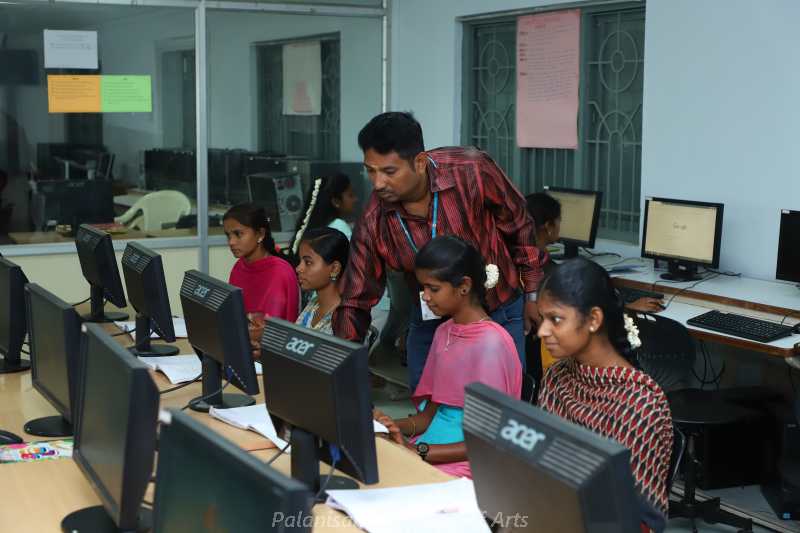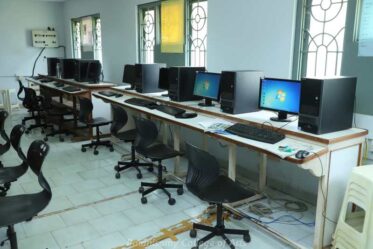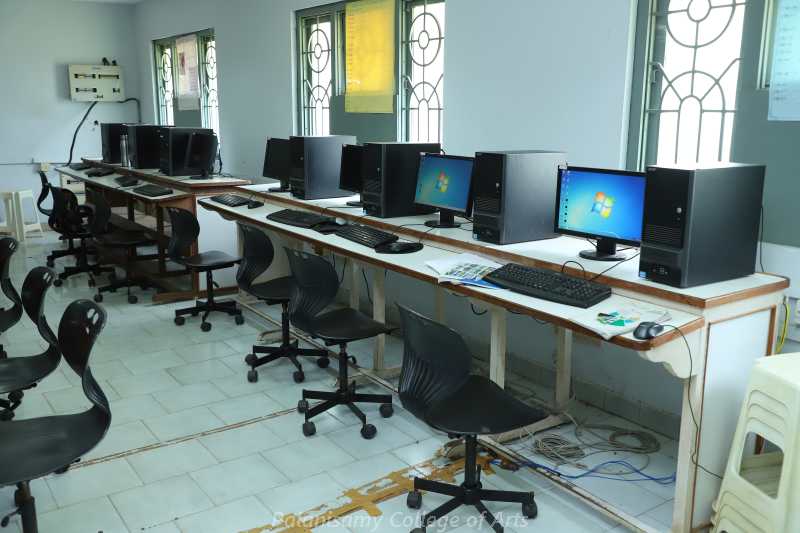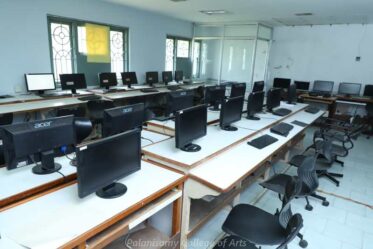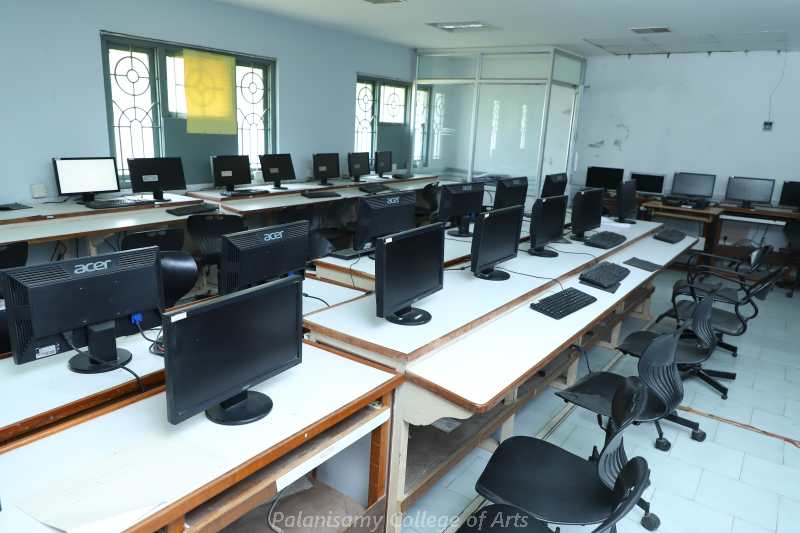B.Sc Information Technology
About The Department
- The Computer Science Department was established in 1990. Our main objective is for the student to establish wide Knowledge in Technical fields. We, the department, equip the students with industry-standard proficiency courses (Theory and Practical) for enriching and empowering their innovative skills in emerging trends and technologies in the domain of Computer science.
- The students are motivated to do Academic or Lab-on Projects with the design and development of advanced tools and techniques. It has dedicated and specialized faculty members in different areas of Computer science with rich experience in academics, industry, and research.
- This programme includes the study of software development, software testing, software engineering, computer networking, web design, databases, programming languages, etc.
- The department has well equipped and large laboratories with modern computer equipment’s. We also provide enrichment pathways to actively engage the students in various academic and non-academic-related activities to explore their own interests in achieving our targeted goals.
DEPARTMENT VISION
To be prominent department of computer science, preparing competent professionals with computation, problem analysis and solving for the industrial and societal related problems with modern tools & technologies.
DEPARTMENT MISSION
• Equipping students with latest software & hardware skills in the field of technology supplemented with practical orientation to take challenges in the modern computing industry.
• Our department combines strong fundamentals of project & team oriented activities soft skills leading to a well rounded professional’s education.
• Build a most conductive environment for problem solving skills and research for lifelong learners.
• Induce Ethical values & sprit of social commitment.
Course Eligibility
A pass in +2 (Academic / Vocational Stream) conducted by the Government of Tamilnadu or any other examination accepted as Equivalent by the Syndicate of Bharathiar University.
Duration of the course
3 years; Full Time
- Bachelor of Information Technology is an undergraduate degree in which students learn the use of software and computer applications to design, develop, implement, and support or management of information systems. Major corporations like TCS, Infosys, Wipro, Vodafone, and HCL have many positions for B.Sc IT graduates.
- IT software industry at Central and State Government Departments, UPSC, and public sector banks like State Bank of India, Central Bank of India, and Canara Bank, among others.
Benefits
- Application Programmer Applications programmers usually focus on business, engineering, or science programs. They write software to handle a specific job, such as tracking inventory.
- Database Administrator A database administrator, or DBA, is responsible for maintaining, securing, and operating databases and also ensures that data is correctly stored and retrieved.
- Hardware and Network Expert Hardware and networking deals with facilitating the use of computer networks. There are various courses in Hardware and Networking
The IT skills in highest demand are currently
• Java
• Machine learning
• Project management
• Quality assurance
• Web development
• Cyber security
• Data science & analytics
• Artificial Intelligence and Machine Learning
• Cloud Computing.
• Mobile Development.
The most important soft skills to master for any IT professional are:
• Communication: Written and verbal ability to effectively communicate ideas.
• Business-Tech Liaison: A subset of communication, this is the ability to speak in the language of both business and technology.
• Presentation Skills: Another subset of communication, the ability to present well to a group can open up the doors of advancement.
• Team Skills: Working well with others, both leading and following well, and the ability to add value to the team.
• Work Ethic: Possessing a strong motivation to get the job done.
• Focus and Vision: The ability to focus on the details without losing sight of the big picture.
• Positive Attitude: Optimistic, energetic, good willed individuals make better team members.
• Time Management: Taking a “Getting Things Done” approach to IT work.
• Self Confidence: Believing in your own ability and not being afraid to ask the tough questions.
• Response to Criticism: The best learners respond well to and actively seek out criticism for self-improvement.
• Flexibility and Adaptability: The ability to be a generalist when required.
• Handling stress: The ability to perform well under the pressure of tight deadlines.
• Etiquette and Punctuality: Things like returning calls, being on time, table manners and saying “thanks” really do matter.
Career Advancement
Under software, you have manufacturing, development, programming, software testing, and maintenance and support. Among related areas are computer operations, database administration, sales/marketing, and data-centre management.
Information Technology (IT), a broad term covering all aspects of managing and processing information in every area one can imagine. Banks, consultants, hospitals, publishers, manufacturers, filmmakers, veterinarians – they all depend on information and information systems. Computer software, hardware, the Internet and the networks that tie it all together are the key to these systems that IT workers design, develop, support or manage.
Information Technology has become the backbone of human work ability and nourished in every single minute by great thinkers to procure valuable and efficient solutions for complex human task.
Technology has given a new life to the world and especially the contribution of computers. Surging growth has increased the complexity of work in this computerized era that has led to the need to develop and consistently upgrade dedicated computer software like project management software, for a number of related requirements.
Your Goals
Goals, both personal and professional, should be an important part of any IT career advancement plan. Goals should be SMART, that is:
• Specific
• Measurable
• Attainable
• Relevant
• Time-sensitive
When breaking down your SMART goals, there are two different sub-categories. Personal goals and professional goals.
To develop your professional goals, you must:
• Know where you are professionally
• Realize where you want to be
• Understand what steps you are going to take to get there
Taking the time to define and pursue professional goals goes hand in hand with career advancement. Without them, you may have no clear path for advancement, and your employer may very well be content keeping you in a relatively static role.
Faculty Details
Dr.P.PRAMESWARI M.Sc., M.Phil., Ph.D.,
Mrs.S.KAVITHA M.C.A., ( Ph.D.,)
Mr.G.RAMANI VENKATACHALAM M.C.A., M.Phil.,( Ph.D.,)
Mrs.N.PRIYADHARSHNI M.C.A.,M.Phil.,
Mrs.K.SARANYA M.C.A., M.Phil.,

